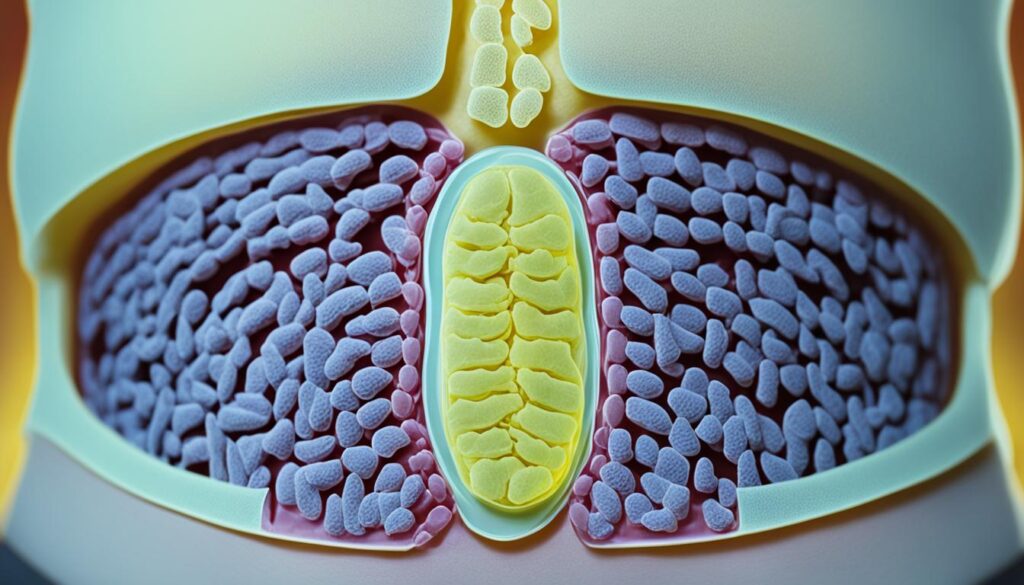Losing belly fat is something many of us want to do. But can we target fat loss to just our stomach? Find out how to lower belly fat and get a flatter tummy.
Having too much belly fat can lead to serious health problems. It raises the risk of heart disease, type 2 diabetes, and some cancers. So, it’s important for both looking good and being healthy.
There isn’t a special way to just lose belly fat. But there are good ways to lower your fat overall and slim down your tummy.
In this guide, we’ll give you tips that are supported by science. These tips will focus on your food, workout, fiber, and stress. They will help you on your path to lose belly fat.
Ready to lose those extra inches? Let’s get started!
The Link Between Belly Fat and Health Risks
Extra weight around your middle, mainly visceral fat, is not good for you. It can lead to serious health problems. People with more belly fat can get heart disease, diabetes, and some cancers more often.
Heart disease is a top killer across the globe. Having too much belly fat makes it more likely to happen. This fat makes bad substances that harm your heart and blood. It can cause high blood pressure, high cholesterol, and block your arteries.
Too much belly fat can also mean a higher risk of diabetes. This disease messes with your blood sugar levels. Visceral fat makes it hard for your body to use insulin right. This is important for keeping your blood sugar in check.
Besides heart disease and diabetes, more belly fat means a greater chance of some cancers. Like breast, colorectal, and pancreatic cancer. We’re still learning how belly fat links to cancer. But, it’s likely because this fat can mess up your body’s balance with hormones and inflammation.
It’s good to know the difference between two kinds of fat. Subcutaneous fat is just under your skin. Visceral fat is deeper, around your organs. Visceral fat is not just sitting there. It makes stuff that can harm you.
Losing belly fat makes you look and feel better. It helps your body in many ways. Even a little weight loss can make your blood vessels work better and lower inflammation. It can also help sleep and blood pressure.

If you want to lower your health risks, work on losing weight and targeting belly fat. Eating well, staying active, managing stress, and getting enough sleep are all important. They’re part of a good plan to lose belly fat and be healthier.
The Role of Diet in Losing Belly Fat
A good diet is key to losing belly fat. You need to eat healthy to burn fat and lose weight. A diet low in carbs and high in fiber is best for dropping body fat.

Studies show a low-carb diet helps people lose more weight than a low-fat diet. But, on both diets, a bit of muscle was also lost. So, eating right is just as important as working out.
Try to do 30 to 60 minutes of exercise each day. This can be anything from running to playing sports. It helps burn calories and keeps you healthy.
For a healthy heart, keep your waistline small. It should be under 35 inches if you’re a woman, 40 for men. Too much belly fat is bad for your heart.
It’s helpful to have friends who also want to be healthy. They can support you in making good food choices and sticking to your exercise plan.
Many people in the U.S. try hard to lose belly fat. There are lots of products that claim to help, but not all of them are safe or backed by science. Remember, there’s no magic pill for losing belly fat.
Being active is key to preventing belly fat. Walking briskly or biking are good ways to keep fit. These activities help you burn fat and stay at a healthy weight.
Sit-ups and crunches aren’t enough to get rid of belly fat. You also need to lift weights. This helps burn calories and improves your metabolism.
What you eat matters a lot for belly fat. Stay away from sugary drinks and food. Instead, eat meals high in fiber like lentils and fruits. They make you feel full and help you eat fewer calories.
Eating enough protein is crucial for losing belly fat. It makes you feel full and stops you from eating too much. Plus, it helps build muscle which burns more fat.
Planning your meals can help you eat better. If healthy food is easy to grab, you’re less likely to eat junk. So, fill your kitchen with nutritious food.
Getting a good night’s sleep is important for losing weight. It helps control your hunger and prevents overeating. Try to sleep seven to eight hours every night.
Want to know more about losing belly fat and getting fit? Check out Hopkins Medicine, Rush University, and Cleveland Clinic. They have great info.
The Importance of Exercise in Burning Belly Fat
Exercise is key to burning belly fat. Just doing core workouts won’t do enough. You need a mix of aerobic exercise and strength training. This combo burns more calories, adds muscle, and promotes losing fat overall.
Brisk walking or jogging is great for your heart and burns lots of calories. Try to do 150 minutes of walking fast or 75 minutes of hard activity a week. You can also swim, cycle, or dance. Mixing up your exercises keeps things interesting and helps your body improve.
Lifting weights or doing other strength exercises builds muscle. More muscle means you burn more calories, even when sitting. Do exercises like squats and push-ups that work all your muscles. Two to three times weekly is good, with a day off in between to rest.
Small changes in your day can help burn more calories. Use stairs not the elevator, walk or bike to work, and find ways to move more. These little adjustments can help you lose belly fat by creating a calorie deficit.
The Benefits of Exercise for Burning Belly Fat
Exercising regularly not only burns calories but has big health benefits. It makes your heart and body stronger. It cuts the chances of getting sick and makes you happier.
By mixing core exercises, ab workouts, and different kinds of exercise into your week, you can lose belly fat. Be sure to talk to a doctor or trainer first, especially if you’re already dealing with any health issues.
The Role of Fiber in Weight Loss
Want to lose weight and cut belly fat? Fiber is key. Especially, soluble fiber helps a lot.
Soluble fiber breaks down in water to form a gel. This gel makes you feel full longer, cutting down on how much you eat. People who eat more soluble fiber usually weigh less and have less belly fat.
You can up your fiber by eating high-fiber foods. Apples, berries, and oranges are full of soluble fiber. They bring many vitamins and minerals. Veggies like broccoli and carrots are good too. Beans and lentils not only have fiber but are also a great protein source.
Whole grains such as oats and brown rice are packed with fiber. They help your health in many ways. Don’t forget seeds like chia and flax. They add extra fiber to your meals.
Increasing fiber in your diet is good, but do it slowly. This helps avoid tummy troubles. Try to get 28 grams of fiber daily for weight loss.
If getting enough fiber from food is hard, think about supplements. Fiber supplements come in pills or gummies and can help you. Talk to a doctor before taking them to be safe.
Adding more soluble fiber to your diet can help you lose weight. Eat lots of fruits, veggies, and whole grains. If you need extra help, supplements could be an option. For the best weight loss, stick to a healthy diet along with these changes.
Managing Stress and Sleep for Belly Fat Loss
Feeling stressed and not sleeping enough can make belly fat worse. When stress hits, our body makes more cortisol. This can add fat around our stomach.
Lack of sleep also plays a role. Without enough sleep, our body can store fat close to our organs. This is bad for our health, especially the belly area.
To deal with stress, doing calming activities helps a lot. This can be yoga, meditation, or deep breathing. These lower cortisol and make stress not harm us as much.
Sleeping well is important for losing weight. Try to sleep for 7 to 8 hours each night without waking up. This gives your body time to recover. Good sleep helps keep our hormones, like cortisol, in balance.
So, fighting stress and sleeping well can help lose belly fat. Mental and emotional health are just as key as physical health. Take care of yourself all around.
Avoiding Factors that Contribute to Belly Fat
Reducing belly fat means being careful with what you eat and do. Certain things in your life can add to it.
Trans fats: Don’t eat too many trans fats found in processed foods and some fats. They can make belly fat grow more.
Sugar-sweetened beverages: Lessen your intake of drinks like soda and juice. They’re high in calories and extra sugars that add to belly fat.
Alcohol intake: Drinking a lot may increase the fat around your organs. Try to drink less for a smaller tummy.
Processed foods: Stay away from foods with lots of sugars, trans fats, and salt. They don’t have much good stuff and can make belly fat stick around.
Getting rid of belly fat needs a lot of good habits. You should eat well, move a lot, relax, and sleep enough.
If you change your life and food for the better, you’ll see less belly fat. This will make you healthier overall.
- Medical News Today – Belly Fat: What You Should
- Mayo Clinic – Belly Fat in Women: Taking — and Keeping — It
- Medical News Today – Eighteen ways to reduce belly
Creating a Comprehensive Approach for Long-Term Success
Want to lose belly fat and keep it off? You need a full plan. It includes making lifestyle tweaks, eating right, and staying active.
To cut calories, pick healthy foods. Watch your portions. Foods with lots of fiber, like fruits and veggies, help you feel full. They also cut belly fat [source]. Studies show, eating more soluble fiber means less belly fat [source].
Working out is also key, both cardio and strength training. This combo burns fat, builds muscle, and shrinks belly fat. Aim for 150 minutes of moderate exercise or 75 minutes of intense work each week. Do strength training twice weekly for even better results.
Don’t forget about stress and sleep. Stress can add belly fat, but you can fight it with yoga or meditation [source]. Not enough sleep messes with your hunger hormones and makes belly fat worse [source]. Try to get 7-8 hours of sleep each night.
Sticking with your plan over time is what really works. Make changes you can keep up with after you reach your goals. Always ask a doctor or dietitian for advice. They can help make your plan suit you best.
